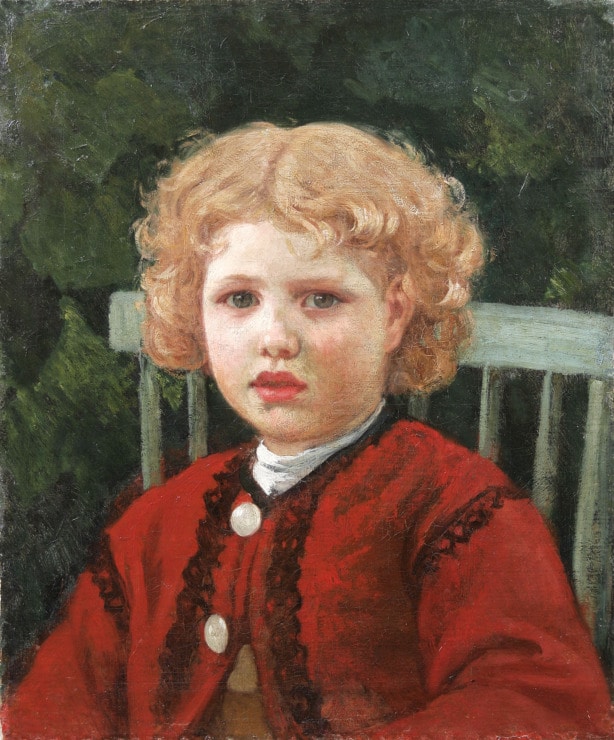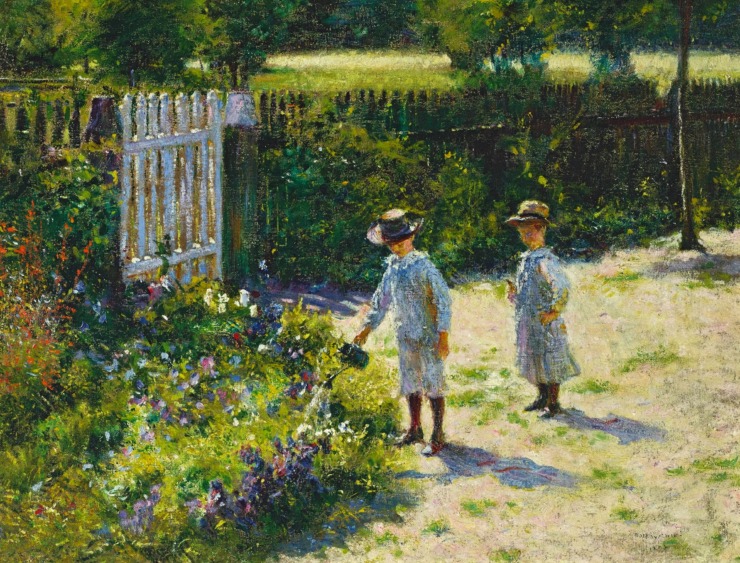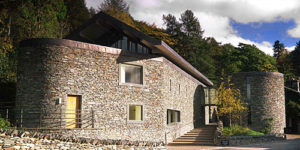< Return to all Wordsworth poems
We are Seven
—A simple Child,
That lightly draws its breath,
And feels its life in every limb,
What should it know of death?
I met a little cottage Girl:
She was eight years old, she said;
Her hair was thick with many a curl
That clustered round her head.
She had a rustic, woodland air,
And she was wildly clad:
Her eyes were fair, and very fair;
—Her beauty made me glad.
“Sisters and brothers, little Maid,
How many may you be?”
“How many? Seven in all,” she said,
And wondering looked at me.
“And where are they? I pray you tell.”
She answered, “Seven are we;
And two of us at Conway dwell,
And two are gone to sea.
“Two of us in the church-yard lie,
My sister and my brother;
And, in the church-yard cottage, I
Dwell near them with my mother.”
“You say that two at Conway dwell,
And two are gone to sea,
Yet ye are seven! I pray you tell,
Sweet Maid, how this may be.”
Then did the little Maid reply,
“Seven boys and girls are we;
Two of us in the church-yard lie,
Beneath the church-yard tree.”
“You run about, my little Maid,
Your limbs they are alive;
If two are in the church-yard laid,
Then ye are only five.”
“Their graves are green, they may be seen,”
The little Maid replied,
“Twelve steps or more from my mother’s door,
And they are side by side.
“My stockings there I often knit,
My kerchief there I hem;
And there upon the ground I sit,
And sing a song to them.
“And often after sun-set, Sir,
When it is light and fair,
I take my little porringer,
And eat my supper there.
“The first that died was sister Jane;
In bed she moaning lay,
Till God released her of her pain;
And then she went away.
“So in the church-yard she was laid;
And, when the grass was dry,
Together round her grave we played,
My brother John and I.
“And when the ground was white with snow,
And I could run and slide,
My brother John was forced to go,
And he lies by her side.”
“How many are you, then,” said I,
“If they two are in heaven?”
Quick was the little Maid’s reply,
“O Master! we are seven.”
“But they are dead; those two are dead!
Their spirits are in heaven!”
‘Twas throwing words away; for still
The little Maid would have her will,
And said, “Nay, we are seven!”
—William Wordsworth
Enjoy Artistic Representations of “We are Seven” by William Wordsworth

Curly-Haired Girl by Adolf von Becker, 1869.

Children in the garden by Władysław Podkowiński, 1892.
Listen to these Readings of “We are Seven”
Listen to this Musical Interpretation of “We are Seven” by William Wordsworth
About William Wordsworth
William Wordsworth, an English poet born in 1770, is credited with having a strong impact on the poetry of his time. He worked with Samuel Taylor Coleridge to publish a collection, Lyrical Ballads, which includes poems believed to be among the most influential in Western literature. With this publication, the two helped initiate English literature’s Romantic Age.

Jerwood Centre at the Wordsworth Trust in Grasmere
Wordsworth also worked to increase the accessibility of poetry, encouraging the use of more common language, and promoting the virtues of lyric poetry.
While in college, Wordsworth went on a walking tour of England and lived for a time in France, where he was greatly impacted by the French Revolution. His earliest work was published in 1793.
His most famous work, The Prelude, was published by his widow in 1850. He worked on the semi-autobiographical poem throughout much of his life, never quite satisfied to publish it.
Wordsworth served as England’s Poet Laureate from 1843 until he died in 1850.